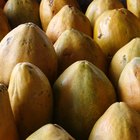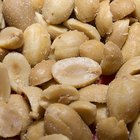
Olive trees have been cultivated for thousands of years. Native to the Mediterranean, olive oil has been used as medicine, in cuisine and as a sign of wealth. Olive oil is made by pressing the oil from olives. The difference between organic olive oil and conventional olive oil is the farming and manufacturing practices employed. Conventional olive does not necessarily contain such additives or pesticides; however, it has not been certified to claim otherwise. Traditionally, all olive oil was what we now call organic; there were no chemical additives or pesticides to aid production.
Conventional
Any olive oil not labeled organic is considered conventional. Conventional olive oil manufacturers are free to use any chemicals, growth enhancers, pesticides or other inorganic compounds that are legally available in the growing and manufacturing processes. Although legal, some of these chemicals may pose risks to environmental and personal health. Synthetic nitrogen fertilizers are often used to add nitrogen to soil, while herbicides and insecticides rid the fields of unwanted weeds or insects. Also, naphthaleneacetic acid may be used in attempt to increase the olives’ size. Conventional techniques are usually used for large-scale olive oil manufacturing.
Organic
Organic olive oil must be designated as such by an overseeing agency; regulations and agencies differ slightly between countries. With such designation, olive oil manufacturers are allowed to label their product organic. Regulations prohibit almost all of the chemicals and growth enhancers that are permitted for conventional production. Instead, organic growers use natural methods to enhance olive growth. For example, organic growers may use manure to fertilize the soil and enhance nitrogen, mow between the trees to eliminate weeds and plant cover crops to manage unwanted insects.
Cost
The cheapest olive oils at the average supermarket will likely be conventional olive oils. Most large scale production of olive oil is done conventionally; because of the higher yield and minimized manpower, the olive oil can be sold at a lower price. Organic olive oil may cost more because of the increased manpower required and smaller scale production.
Taste
Olive oil boasts vibrant tastes that varies by the region and method of production. Taste categories are identical for both organic and conventional olive oil and can include fruitiness, sweetness, pepper and greenness. For example, a conventional olive oil from California with a green edge to it will suggest grassiness, while an organic peppery olive oil from Italy might have a slight spice. Some aficionados claim that organic, traditional methods produce the finest olive oil.
Varieties
Both organic and conventional olive oil are rated according their acid content—the lower the acid, the higher the grade. The highest grade is extra virgin olive oil, followed by virgin, then semi fine, then pure. Most organic olive oils will be extra virgin. Most organic olive oil in the United States is produced in California and uses Mission, Manzanillo, Sevillano and Ascolano varietals. Organic and conventional extra virgin olive oil exhibit the greatest depth and range of flavor.
Related Articles

Health Benefits of Organic Foods Vs. ...

What Is the Difference Between Eating ...

Hydroponic Vegetable Nutrients Vs. ...

What Are the Benefits of Extrapone ...

Government Grants for Churches

What Countries Harvest Pearls?

Advantages of Vermicompost

The Nutrition of Fresh Ground Peanut ...

What Kinds of Nuts Don't Grow on Trees?

The Effects of Organic Fertilizer on ...

Grants for Christian Counselors

In What Parts of the World Are Valuable ...

List of Foods That Are Commonly ...

Alfalfa Hay Nutrition Information

Are Pickled Vegetables Allowed on a Raw ...

Gherkins vs. Bread and Butter

Type of Peanuts Used to Make Peanut ...

What Do the Amish Feed Their Chickens?

How to Cook Mixed Greens

Differences Between Roasted & Raw Nut ...
References
Writer Bio
Erik Nielsen started writing professionally in 2010. He writes primarily for eHow, specializing in philosophy, theory and food topics. Nielsen earned his Bachelor of Arts in philosophy from the University of California, Berkeley, and also holds an Associates of Arts in philosophy from Santa Barbara City College.
Photo Credits
Bottle of Olive Oil image by kellykramer from Fotolia.com